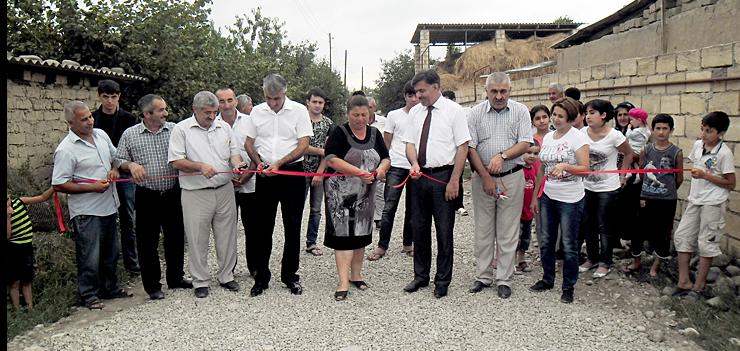EWMI’s Socio-Economic Development Activity in Azerbaijan (SEDA) project has led several high impact initiatives these past few months with very promising outcomes. SEDA brought better roads to a small town in Khachmaz, raised awareness and improved services for the elderly and disabled, and finally helped support advocacy groups in applying pressure to reform the local seed registry in Azerbaijan.
Building New Roads to Opportunity
During the initial EWMI-supported community meeting to identify the community of Khachmaz’s needs, the majority of community members expressed the need for the construction of a school building and repairs to the community’s often impassable roads. Good news came quickly when the Community Development Council (CDC) announced that the government planned to build a new school in the community in the near future. In the meantime, EWMI began construction on the rehabilitation of the community’s roads, breaking ground in June of 2013. The roads have been recently completed, and the construction of the secondary school is well underway. This was a dream come true for many of Khachmaz’s community members. “For years we have been dreaming that our children could safely walk through repaired roads to a community school. Now we are very excited that this year both problems were addressed,” said Gulesmer Abbekirova, CDC Coordinator.
Advocacy Outreach on People with Disabilities and Social Workers
EWMI’s SEDA Civic Engagement Grant program, along with the Society for Humanitarian Research (SHR), recently secured support for Azeris with disabilities by starting a dialogue with civil society organizations (CSOs), relevant state bodies, and ministries on some of the issues this group faces. Gunel Hasanova, an active participant of the advocacy campaign, stated, “Prior to SHR’s activities, there was a lack of information … I think this project is a successful step forward in terms of informing people of different levels of ability through this project and defining and supporting those who are interested in social work.” In addition, SHR led an effort to conduct special training courses, and they also reached out to young people to involve them in their advocacy campaigns for people with disabilities. “We hope these initiatives will improve the relevant legislative framework” and “deepen the interest in social work,” stated Teyyub Mirgasimov, Director of the Regional Cooperation and Community Development Center.
Local Seeds for Growth in Azerbaijan
The current Seed Registration Law in Azerbaijan falls short for many Azeri farmers. The price of imported seeds is high, making it difficult for many farmers to purchase them. Without an established registry of local seeds as another option, many farmers find themselves in a difficult position, which incites many of them to call for tougher regulations and simplified procedures on the current Seed Registration Law. A simpler seed registry with tighter regulations can also help restore the country’s seed selection tradition and spread existing local varieties. Mursal Gurbanov, a farmer from Aghdam rayon asserts, “I believe that seeds can be sold to farmers at a reasonable price once the registration process is simplified.”
To address this issue, EWMI began to support the advocacy efforts of AKTIVTA, a local CSO. As a direct result of AKTIVTA’s advocacy efforts, the State Seed Testing Commission involved farmers in testing seed varieties in its regional testing centers for the first time. The Commission is planning to continue to regularly conduct seed variety testing with farmer participation and is also committed to simplifying the seed registration procedures. Finally, AKTIVTA republished a new version of state seed varieties, which provides valuable information to local seed importers and international seed companies, and even submitted recommendations on seed variety registration procedures to the “Seed Policy Paper,” a report prepared by the Ministry of Agriculture.


